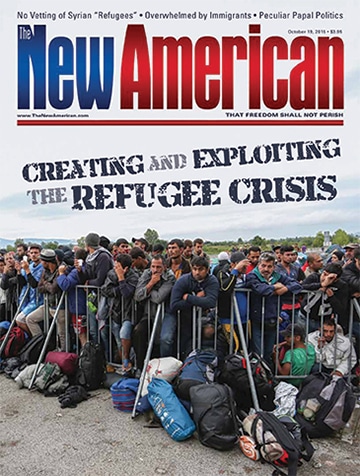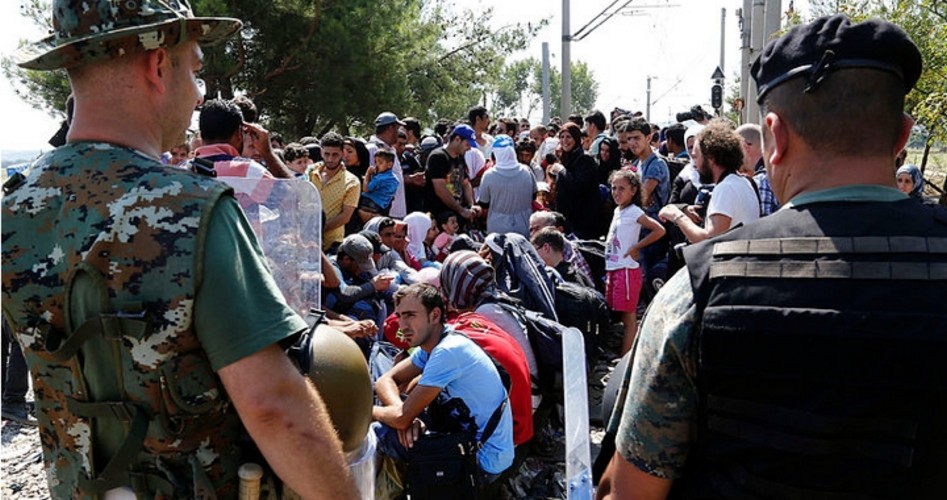No Vetting of Syrian “Refugees” in Obama’s “Resettlement” Invasion
House Judiciary Committee Chairman Bob Goodlatte and Senate Judiciary Committee Chairman Chuck Grassley warned that the Obama administration’s Syrian refugee plan poses serious security dangers to the United States, after Secretary of State John Kerry announced that the United States would accept 10,000 additional Syrian refugees on top of the 75,000 worldwide refugees the president planned to admit into the country.
“ISIS and other terrorist groups have made it abundantly clear that they will use the refugee crisis to try to enter the United States,” the two chairmen noted in a joint statement issued on September 20. “Now, the Obama administration wants to bring in an additional ten thousand Syrians without a concrete and foolproof plan to ensure that terrorists won't be able to enter the country.”
"The administration has essentially given the American people a 'trust me.' That isn't good enough," said Goodlatte and Grassley.
Top intelligence community officials have publicly and privately acknowledged that they have no way to properly vet Syrian refugees to weed out those who may be ISIS terrorists, or may have ties to other terrorist and extremist groups. In testimony before the Transportation Security Subcommittee of the House Homeland Security Committee on February 11, 2015, Michael Steinbach, assistant director of the FBI’s Counterterrorism Division, confirmed that federal authorities are unable to offer any assurances that the many thousands of Syrians President Obama proposes to bring to America will be subjected to any reasonable security checks.
During questioning, Steinbach explained to Representative John Katko (R-N.Y.), chairman of the Transportation Security Subcommittee, that it would be impossible to vet the Syrian refugees because “there is a lack of information.”
“And is there [sic] ways you can suggest we go about to get this information?” Katko asked. “I just don’t think you can go and get it,” FBI’s Steinbach replied. “We’re talking about a country that’s a failed state, that does not have any infrastructure, so to speak. So, all the datasets, the police, the intel services you would normally go and seek that information [from] don’t exist.” Katko remarked: “And that obviously raises a grave concern about being able to do proper background checks on the individuals coming into the country.” “Yes,” Steinbach replied. (See congressional hearing video below.)
“Out of Control” — but Bring Them in Anyway
The U.S. intelligence community cannot even ascertain whether or not the “Syrians” proposed for admittance are actually Syrians, since more than 20,000 foreigners reportedly have been involved in fighting there.
“We don’t have it under control,” Steinbach told the committee. “Absolutely, we’re doing the best we can. If I were to say that we had it under control, then I would say I know of every single individual traveling. I don’t. And I don’t know every person there and I don’t know everyone coming back. So it’s not even close to being under control.”
House Homeland Security Committee Chairman Michael McCaul (R-Texas) issued a statement on September 10 pointedly critical of the Obama-Kerry plan to vastly increase the number of Syrian refugees brought to the United States, despite the clear lack of security checks.
“The President wants to surge thousands of Syrian refugees into the United States, in spite of consistent intelligence community and federal law enforcement warnings that we do not have the intelligence needed to vet individuals from the conflict zone,” McCaul stated. “We also know that ISIS wants to use refugee routes as cover to sneak operatives into the West. I implore the President to consult with Congress before taking any drastic action and to level with the American people about the very real security challenges we face.”
Senator Jeff Sessions (R-Ala.), chairman of the Senate’s Subcommittee on Immigration and the National Interest, responded on September 21 to the announcement from Secretary of State John Kerry that the United States would expand its intake of refugees over the next two years to nearly 200,000. This massive increase would be in addition to the existing annual resettlement of those seeking asylum, illegal border-crossers, foreign workers, and global green card recipients.
"The U.S. has already taken in four times more immigrants than any other nation on Earth,” Senator Sessions declared in a press statement. “Our foreign-born population share is set to break every known historical record. Since 9/11, we have permanently resettled approximately 1.5 million migrants from Muslim nations inside the U.S. Ninety percent of recent refugees from the Middle East living in our country are receiving food stamps and approximately 70 percent are receiving free healthcare and cash welfare. All of the nearly 200,000 refugees the Administration is planning to bring over the next two years would be entitled to these same benefits the moment they arrive. Since we are running huge deficits, every penny of these billions in costs will have to be borrowed and added to the debt. This refugee expansion would be in addition to the 1 million autopilot green cards handed out each year by the government to mostly low-wage migrants, including a large share from Middle Eastern nations.”
Senator Sessions noted that our schools, job markets, and public resources are already stretched extremely thin. He remarked further that “we have no capacity to screen for extremist ideology, as we have seen with the surge of ISIS recruitment in Minnesota's Somali refugee community.”
Chairman Sessions continued:
Middle Eastern nations must take the lead in resettling their region's refugees. The goal of responsible refugee resettlement should be to relocate displaced persons as close to their homes as possible and to seek their return to their country of origin in more stable conditions. It has also been reported that 3 in 4 of those seeking relocation from the Middle East are not refugees but economic migrants from many countries.
At bottom, it is not a sound policy to respond to the myriad problems in the Middle East by encouraging millions to abandon their home. Absorbing the region’s migrants is not a long-term strategy for stabilizing the region; instead, we should look soberly at our most recent actions in Libya, Syria, Iraq and elsewhere while encouraging migrant populations to remain in the region where they can contribute to social and political reforms.


